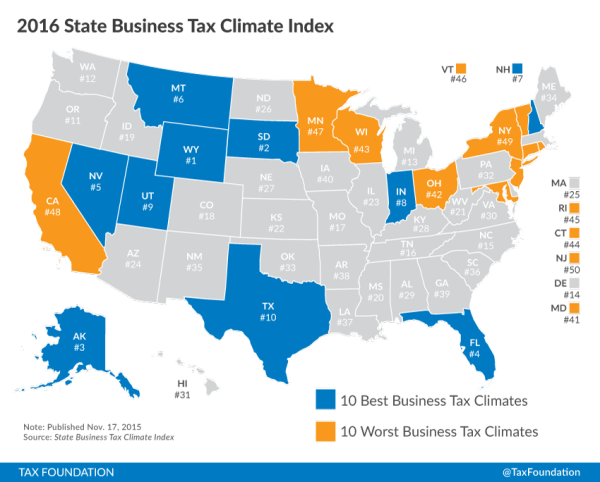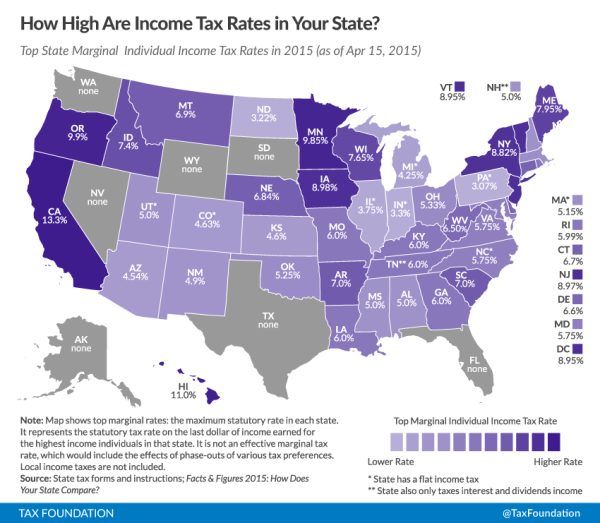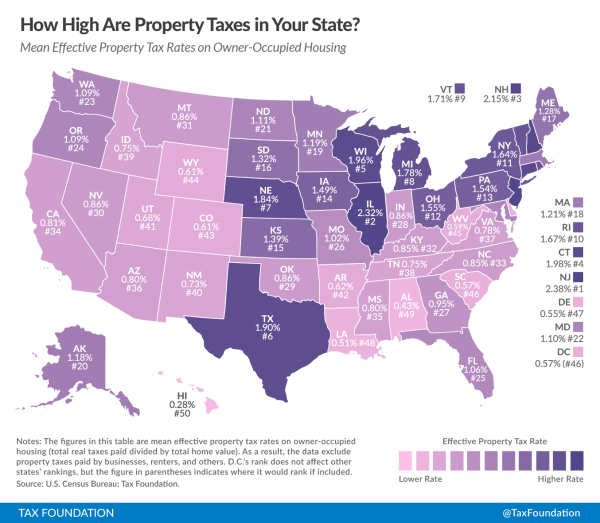Federalism is a great idea, and not just because America’s Founders wanted a small and limited central government.
It’s also a good idea because states are laboratories that teach us about the benefits of good policy and the costs of bad policy.
And when we specifically look at New Jersey, we can learn a lot about the negative consequences of excessive taxation.
Lesson Number 1: Don’t adopt new taxes.
Just fifty years ago, New Jersey was like New Hampshire with no income tax and no sales tax. It was a fast-growing and prosperous refuge for people escaping high tax burdens in New York and elsewhere.
But then a state sales tax was adopted in 1966, followed by the enactment of a state income tax in 1976. Not surprisingly, politicians used those revenue sources to finance an orgy of new spending, to such an extent that New Jersey is now in last place in a ranking of state fiscal conditions.
And ever since new taxes were adopted, politicians have routinely and repeatedly increased the rates, diverting ever-greater amounts of money from the state’s private sector.
The net result, as demonstrated by the Tax Foundation’s State Business Tax Climate Index, is that New Jersey now has the worst tax system in the entire nation.

A very high income tax burden is a major reason why New Jersey is so uncompetitive.
After thriving for centuries with no state income tax, it only took state politicians a few decades to create a very punitive system with the fifth-highest rate in the nation. Once again, the Tax Foundation has the data.

No wonder so many investors, entrepreneurs, and business owners are escaping New Jersey.
And this is exactly what’s been happening, with very negative effects on New Jersey’s economy. Here’s some of what I shared back in 2010.
More than $70 billion in wealth left New Jersey between 2004 and 2008 as affluent residents moved elsewhere, according to a report…Conducted by the Center on Wealth and Philanthropy at Boston College… The exodus of wealth, then, local experts and economists concluded, was a reaction to a series of changes in the state’s tax structure — including increases in the income, sales, property and “millionaire” taxes. “This study makes it crystal clear that New Jersey’s tax policies are resulting in a significant decline in the state’s wealth,” said Dennis Bone, chairman of the New Jersey Chamber of Commerce and president of Verizon New Jersey. …the report reinforces findings from a similar study he conducted in 2007 with fellow Rutgers professor Joseph Seneca, which found a sharp acceleration in residents leaving the state. That report, which focused on income rather than wealth, found the state lost nearly $8 billion in gross income in 2005.
Wow, that’s the Atlantic version of California.
By the way, politicians often impose taxes or increase tax rates using the excuse that they will lower other taxes.
And it hasn’t been uncommon for New Jersey politicians to tell voters that tax hikes will enable lower property taxes.
Yet if you look at this data from the Tax Foundation, the Garden State has the highest property tax burden in the nation.

The only “good news” is that New Jersey’s 6.97 percent state sales tax is only the 24th-highest in the United States.
Yet when you consider that there was no state sales tax until 1966, that’s hardly a sign of fiscal restraint.
Lesson Number 2: Get rid of taxes that are especially destructive.
New Jersey is one of only two states that impose both an inheritance tax and a death tax. The death tax is particularly pernicious since very successful taxpayers obviously have considerable ability to migrate to states with better policy.
But here’s where we might have a bit of good news. New Jersey may be about to eliminate its death tax.
A state Senate committee on Monday passed…bipartisan proposals to eliminate the estate tax… Proponents of the tax changes say people are leaving New Jersey to avoid its low thresholds on taxing inherited wealth and retirement income. More than 2 million people left New Jersey between 2005 and 2014, costing the state $18 billion in net adjusted income and $11.4 billion in economic activity, according to the New Jersey Business and Industry Association, which blames high taxes for the exodus. …State Sen. Steve Oroho (R-Sussex) said he expects the money New Jersey reaps from people who stay here will pay for the lost tax revenue. The bill (S1728) was approved 9-0 with four abstentions.
This is amazing evidence of the liberalizing impact of tax competition. New Jersey’s state legislature is dominated by leftists, yet even they realize that they won’t get any loot if their intended victims can move across states lines (a lesson that French politicians have a very hard time understanding).
Lesson Number 3: Politicians waste much of the revenue they collect.
Politicians generally like higher taxes because they can buy support and votes by redistributing other people’s money (though some leftists like higher taxes solely for reasons of spite).
So it’s also important to look at what’s happening on the spending side of the budget. And it turns out that New Jersey wastes a lot of money.
I’ve already written about state bureaucrats being grossly overpaid (see here andhere for some jaw-dropping examples).
But now let’s look at New Jersey’s “rate of return” or “efficiency” on transportation spending. This great video from Reason tells you everything you need to know.
And one of the reasons I shared this video is because New Jersey politicians want to boost the gas tax so they can spend even more money. Indeed, they may even hold the death tax hostage to get what they want.
Democrats have said they hope to leverage these tax cuts into a deal with Gov. Chris Christie to raise the gas tax.
I rhetorically asked back in 2010 whether Chris Christie could save New Jersey. We now know the answer is no, but maybe he can partially redeem himself by winning the death tax fight without surrendering on the gas tax.
P.S. Another formerly low-tax state, Connecticut, decided to copy New Jersey and the results are similarly dismal. Let’s hope other states, especially Alaska and Washington, are paying attention.
———
Image credit: Nick Youngson | CC BY-SA 3.0.

